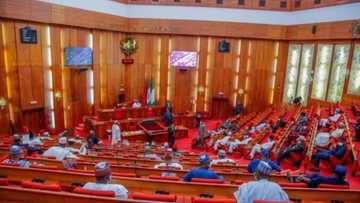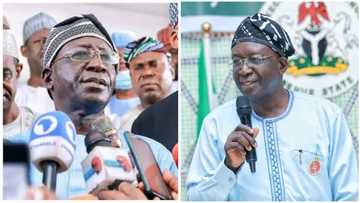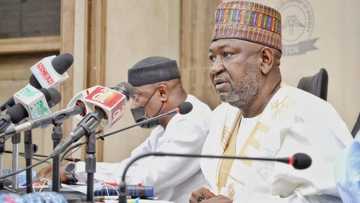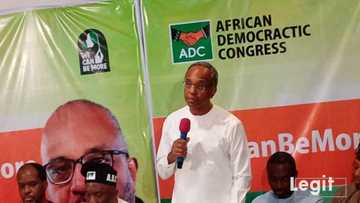My Take on Nigeria’s New Revenue Allocation Formula by Jide Ojo
Editor's Note: Jide Ojo, a veteran political analyst and newspaper columnist, writes about the newly proposed revenue allocation formula recently presented to President Muhammadu Buhari.
LAST Thursday, April 7, 2022, the chairman of Revenue Mobilisation, Allocation and Fiscal Commission, Elias Mbam, presented the report of the proposed new revenue allocation formula for Nigeria to the President, Major General Muhammadu Buhari (retd.), at the State House.
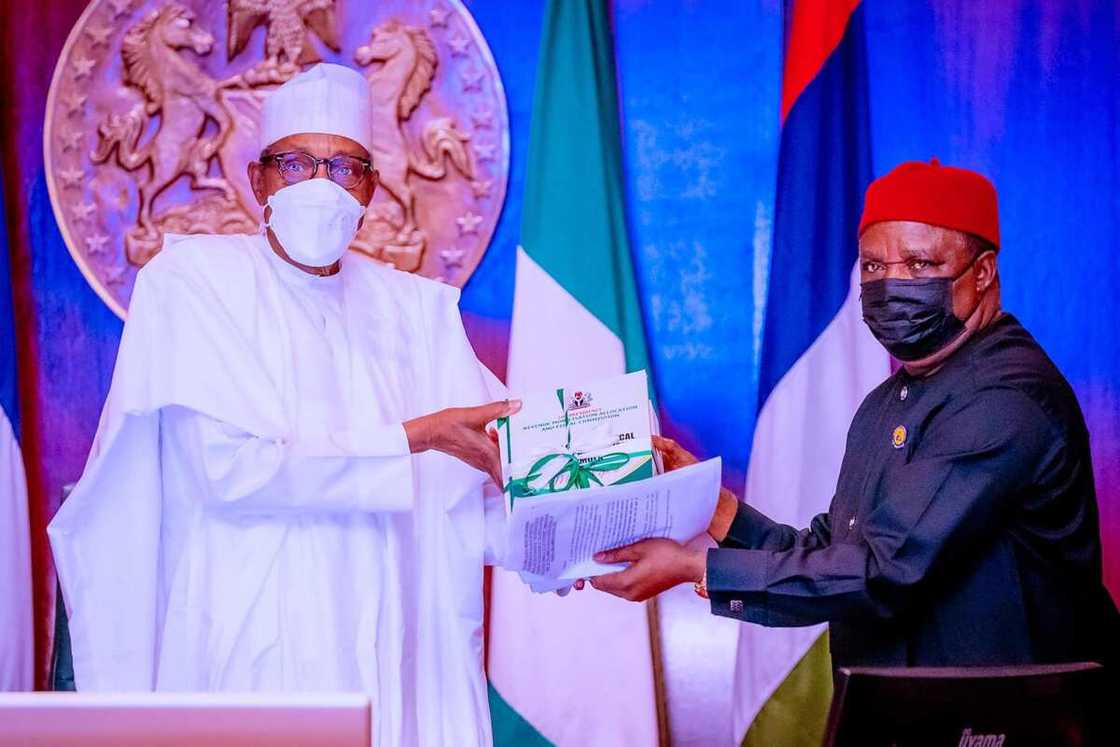
Source: Facebook
This is coming 30 years after the last exercise was carried out in 1992. Highlighting the key recommendations in the report, Mbam said the proposed vertical revenue allocation formula suggested 45.17 per cent for the Federal Government, 29.79 per cent for state governments and 21.04 per cent for the local governments.
Under the current sharing arrangement, the Federal Government takes 52.68 per cent of the revenue share, states get 26.72 per cent while local governments get 20.60 per cent. Under special funds, he said, the report by the commission recommended 1.0 per cent for ecology, 0.5 per cent for stabilisation, 1.3 per cent for development of natural resources and 1.2 per cent for the Federal Capital Territory.
In arriving at the new vertical revenue allocation formula, Mbam said there was wide consultation with major stakeholders, public hearing in all the geo-political zones, administering of questionnaires and studying of some other federations with similar fiscal arrangements like Nigeria to draw useful lessons from their experiences.
Do you have a groundbreaking story you would like us to publish? Please reach us through info@corp.legit.ng!
According to the RMAFC chairman, the commission also visited all the 36 states and the FCT, the 768 local government areas and six area councils to sensitise and obtain inputs from stakeholders.
He added that literature reviews were conducted on the revenue allocation formula in Nigeria dating back to the pre-independence period. The commission also reportedly received memoranda from the public sectors, individuals and private institutions across the country.
Mbam noted that since the last review was conducted in 1992, the political structure of the country has changed with the creation of six additional states in 1996, which brought the number of states to 36. Concomitantly, the number of local governments councils also increased from 589 to 774.
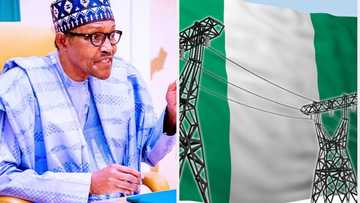
Read also
Nigerian government announces over N225bn revenue from electricity export to 3 countries in 5 years
The response of the president to the new revenue allocation formula is on point. He said inter alia that he will await the final outcome of the constitutional review process before presenting the report to the national assembly but assured members of the commission that the Federal Government would in the immediate period subject the report to its internal review and approval processes.
The president was spot on when he said:
‘‘Considering the changing dynamics of our political-economy, such as privatisation, deregulation, funding arrangement of primary education, primary health care and the growing clamour for decentralisation among others, it is necessary that we take another look at our revenue sharing formula, especially the vertical aspects that relate to the tiers of government.”
I was on the lookout for information about the proposed review of the salaries of political and judicial office holders which the commission promised to undertake last year. I recall that myself and the chairman of RMAFC were guests on Good Morning Nigeria on Nigerian Television Authority early last year where he reiterated that promise.
The snippet of the report published thus far is silent on this. Perhaps in due course this too shall be made known. Back to the report, is there a possibility of the new revenue sharing formula getting implemented in the life of this administration? This is doubtful. I said this against the background of some of the other recommendations in the report.
It was reported that RMAFC proposed:
‘‘Establishing local government as a tier of government and the associated abrogation of the state/local government account; moving airports; fingerprints, identification and criminal records from the exclusive legislative list to the concurrent legislative list, empowering the RMAFC to enforce compliance with remittance of accruals into and disbursement of revenue from the Federation Account as well as streamlining the procedure for reviewing the revenue allocation formula.’’
These preconditions will be tough to meet. State governors do not want independence for local governments nor do they approve of amendment of section 162(6) which sets up “State Joint Local Government Account.”
Apart from the fact that this wasn’t among the 68 items the National Assembly voted on on March 1, 2022 for alteration in the constitution, even if it were among, the governors who have ‘privatised’ local government and see the funds of the councils as a honeypot will not want that to be taken away from them.
Truth be told, state governors have bastardised section 162(6), (7) and (8) of Nigerian Constitution which are meant to see to adequate funding of the 768 local government areas as recognised by section 3(6) of the Constitution of the Federal Republic of Nigeria 1999, as amended. It is noteworthy that even the financial autonomy granted to the state judiciary and House of Assembly since 2018 has not been implemented or executed partially by a few states which decided to give it a thought.
Secondly, the RMAFC review is coming at the wrong time. I am of the considered view that, perhaps, given the proposed alteration of the constitution in which five items viz. airports, prisons, railway, electricity and fingerprints, identification and criminal records are being planned for removal from the Exclusive Legislative List to the Concurrent Legislative List, if this devolution of power eventually takes place, there may be a need to give more resources to the state than the one being proposed by RMAFC.
Anyway, the National Assembly can always amend the proposed revenue sharing formula to reflect that reality when the time comes. I am, however, excited that this is a fiscal restructuring which is part of what is being agitated for by Nigerians.
The big challenge now is politics. Political parties are preparing for their party primaries which will be held from April 4 to June 3, 2022. Thereafter will be the time for campaigns which according to section 94(1) of the new Electoral Act 2022 will now hold for five months (150 days).
This means the National Assembly will not be focused on lawmaking and oversight probably until elections are over in March 2023. Since many of the federal and state lawmakers may be seeking reelection their attention will be primarily fixed on that than their constitutional responsibility. This is why I said this proposed new revenue allocation formula may not see the light of the day under the Buhari regime.
Most importantly, as I said on Daily Politics on Trust TV when this issue was discussed on Friday, April 8, 2022, the key issue in the revenue share should not be about who gets more or less but what the managers of these resources or revenue do with the money.
Accountability and transparency in the management of our commonwealth have been a serious challenge from independence. None of our 11,891 elected political office holders has demonstrated prudence in public finance management.
They are more concerned about personal aggrandisement. If only the financial leakages of public resources could be effectively blocked and our monies are made to work for us, we wouldn’t be talking of infrastructural deficit today or lack of national development. Invariably, what is needed most is zero tolerance for corruption, prudent management of public resources and, ultimately, good governance.
Tweet at @jideojong
Disclaimer: The views and opinions expressed here are those of the author and do not necessarily reflect the official policy or position of Legit.ng.
Source: Legit.ng


